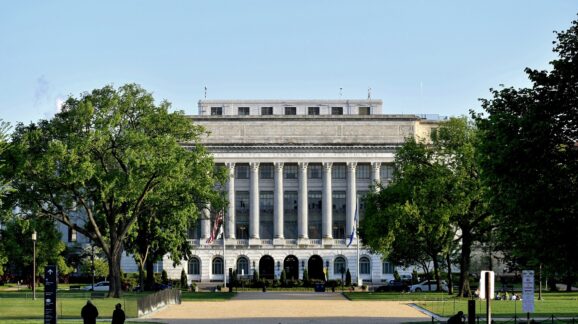Proposed USDA rule disregards recent Supreme Court rulings

Photo Credit: Getty
The first two of the four priorities the US Department of Agriculture (USDA) lists on the homepage of its website are tackling social justice, equity, and opportunity and addressing climate change. In view of this ostentation of obsessions that are outside of the USDA’s statutory authority, the agency deserves some credit for addressing in a proposed rulemaking one of its actual responsibilities, enforcing the Packers and Stockyards Act of 1921. Unfortunately, as CEI explains in the comment it submitted earlier this week, the proposal combines a disregard of economics with contempt for the rule of law.
The Supreme Court’s landmark rulings on administrative law this past term, Loper Bright Enterprises, Inc. v. Raimondo and SEC v. Jarkesy,are the comment’s bookends. The comment points out at the outset that the USDA had the misfortune of proposing a rule it said would provide the courts with clearer standards on the very day that the Supreme Court decided Loper Bright and held that the duty to provide standards flows in the opposite direction.
When analyzed in light of the standards found in prevailing case law, the proposed rule fares poorly. It seeks to define the unfair practices prohibited by the Packers and Stockyards Act. In doing so, it fails to require anticompetitive effect as an element of an unfair practice—in deliberate defiance of numerous decisions of federal courts of appeals as well as the Supreme Court. The proposal’s overly broad definition of “unfair” is inconsistent with the text of the Act and subjects legitimate business practices and arrangements that have competitive justifications to the peril of civil fines, cease and desist orders, and reparations.
On the other side of the argument, the USDA received on Regulations.gov a virtual mailbag of identical comments carelessly copied and pasted from a petition written by a Care2, a leftist organization that generates such things. These comments asserted that the proposal would help level the playing field by “clarifying what is considered an "unfair practice" [sic].”
Notwithstanding Care2’s confusion of the notice-and-comment process with the process of stuffing a ballot box, the USDA should recognize that it has a more pressing matter to deal with than this misguided rulemaking, namely compliance with Securities and Exchange Commission v. Jarkesy.
CEI’s comment closes with a discussion of Jarkesy, a case that makes the proposed rule largely unenforceable. In Jarkesy the Supreme Court held that the right to a jury trial “[i]n Suits at common law” guaranteed by the Seventh Amendment to the Constitution extends to statutory claims that are comparable to common law lawsuits. A statutory claim for a civil penalty under the Packers and Stockyards Act is comparable to common law lawsuits involving debts, contracts, and restraints of trade. As a result, the Seventh Amendment requires a jury trial in federal court if the Department seeks to assess a civil penalty for violation of the Packers and Stockyards Act. But the Act does not allow that to happen. The Department can pursue civil penalties only in agency enforcement proceedings.
The USDA should propose legislation permitting it to try alleged violations of the Packers and Stockyards Act in federal court before a jury. In the meantime, it should prepare a rule announcing that under the current state of the law it will not seek civil penalties in cases it initiates pursuant to the Packers and Stockyards Act. Such a rule is needed and lawful. Neither of those characteristics, however, can be attributed to the proposed rule.